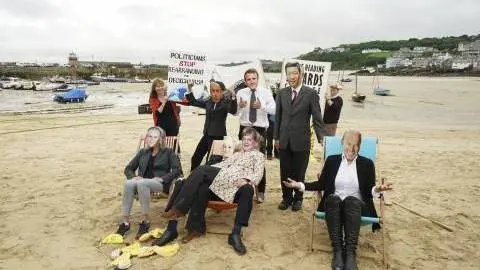Back from the beach, into the breach
Covid, supply chains, inflation and some sort of normality for central banks. These remain the four key challenges for global leaders. The European autumn could be a game-changer. But we want to prepare you for a marathon rather than a sprint
The European autumn could be a game-changer for the world
Covid, supply chains, inflation and some sort of normality for central banks; all these key themes could see some positive movement over the coming months. But in our latest ING Monthly, at www.ing.com/THINK, we want to prepare you for a marathon, not a sprint
We are back. Fully recharged, we're taking a fresh look at the global economy, we're reassessing previous calls and are now looking forward to an exciting autumn. In fact, the summer confirmed and accentuated the four most important themes for the global economy: the ongoing fight against Covid and its variants, supply chain frictions, inflation and central banks’ long and winding road to the exit lane. The G7 leaders, who met in an English seaside resort back in June, still have a huge task in front of them. And they'll still face plenty of protests, perhaps just not quite as creative as the one we use to illustrate our latest ING Monthly.
The Delta variant has become the dominant strain and is a worry for financial markets as it could dent the economic recovery. However, assessing the impact of Delta on global growth requires a more differentiated approach. Delta is not yet slowing down the entire global economy but is an important driver of a two-speeded recovery. While most developed economies have reached a vaccination rate of around 60%, which allows governments to refrain from new lockdowns, much lower vaccination rates in emerging economies have led to a ‘zero Covid’ approach by many Asian governments. These differences in vaccination rates and government reactions clearly lead to diverging growth prospects. Luckily, there is one clear upside: leaving new Covid variant surprises aside, we see the global economy reaching herd immunity before next summer; be it via vaccinations or cured infections.
For developed economies and particularly the ones with a strong industrial backbone, supply chain frictions have probably become an even bigger risk to the economic outlook than Delta. Further delivery and production delays could clearly weigh on the growth path for the next 12 months. Supply chains are also a potential transmission channel for lagging growth and ‘zero Covid’ in Asia to spill over to Europe and the US.
Supply chain problems not only lead to production delays but are also one of the main drivers behind the surge in inflation in both the US and the eurozone. We have written a lot about inflation since the start of the year and our bottom line is still the same: yes, the largest part of the current inflation surge can be explained by one-off factors and base effects. However, even if headline inflation drops back next year, inflation is likely to be stickier than some, particularly some central banks, currently expect. Record high producer prices, a high willingness to pass these costs onto consumers who, with a strong post-lockdown appetite for spending and some excess savings, are more than willing to accept higher prices. Also, with the lack of qualified workers, some pass-through on wages is also likely. And don’t forget that one important disinflationary driver has turned into a more inflationary force: globalisation.
As higher inflation could dent consumer spending, central banks are facing a difficult choice of when or whether to taper. While tapering could undermine the economic recovery and disrupt financial markets, leaving it too late could put central banks behind the curve and trigger much stronger policy reactions in the future. It looks as if both the Federal Reserve and the European Central Bank are currently willing to allow at least some second-round effects on wages. A very cautious and very gradual taper is the result. In the US this is more likely to happen than in the eurozone, where the ECB has shifted from dovish to overly dovish during the summer months.
And while central banks are still searching for the exit, one politician who has shaped the European and global economy over the last 16 years will definitely exit. The German elections at the end of the month mark the end of Angela Merkel’s four terms in office. However, the current too-close-to-call election race in Germany could lead to very long coalition negotiations and could force Merkel to stay on longer than she herself had thought.
Autumn could bring a race to the exit lane, for the pandemic, central banks and for Angela Merkel. There is clearly the risk that this will be more of a marathon than a sprint.
Download
Download article
2 September 2021
ING Monthly: Back from the beach, into the breach This bundle contains 11 ArticlesThis publication has been prepared by ING solely for information purposes irrespective of a particular user's means, financial situation or investment objectives. The information does not constitute investment recommendation, and nor is it investment, legal or tax advice or an offer or solicitation to purchase or sell any financial instrument. Read more
